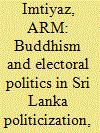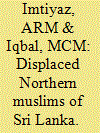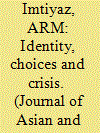| Srl | Item |
| 1 |
ID:
132312


|
|
|
|
|
| Publication |
2014.
|
| Summary/Abstract |
Organized religions often play a significant role in the political affairs of any country when political actors carefully employ them to pursue power. Buddhism is the major religion on the island of Sri Lanka, and often it becomes a powerful symbol for Sinhala-Buddhist politicians. This study examines the interaction between Buddhism and politics in Sri Lanka, and will attempt to examine the religious factors in Sri Lanka's ethnic conflict between the two nations; namely, Tamil and Sinhala. It will examine how the politicization of Buddhism helped Sinhala political elites and leaders in their quest for power, reinforcing religious and ethnic tensions, and finally will discuss some solutions to de-religionize the state structure to help Sri Lanka enjoy the fruits of modernization and democracy.
|
|
|
|
|
|
|
|
|
|
|
|
|
|
|
|
| 2 |
ID:
108498


|
|
|
|
|
| Publication |
2011.
|
| Summary/Abstract |
It has been widely established as fact that ethno-political conflict and civil war between the Tamils and the Sinhalese in Sri Lanka have generated immense sufferings among the Tamil and Sinhalese ethnic groups at the level of the masses. However, very little has been discussed about the plights of the Muslims of the North and East, particularly the former who became victims of the Sri Lanka's long running ethnic conflict. In October 1990, the entire Muslim population of Jaffna, Vavumiya, Mullaitivu, Mannar and Kilinochchi districts in the northern region were evicted from their homes at gun point and turned into Internally Displaced Persons overnight by the Tamil Tigers (Liberation Tigers of Tamil Eelam). Muslims of the North claim that they have some basic and important problems to be solved. This study attempts to identify some of the special problems of the expelled Northern Muslims who are languishing in the state supported refugee camps in Puttalam district. A questionnaire on the special problems of the Northern Muslims was circulated to the North Eastern youth, students, unemployed Muslims, and farmers. The population of the target group was selected randomly. More than 250 questionnaires were issued. Ninety percent of them responded to the questionnaire. Interviews were also conducted over the phone with an educated section of the Northern Muslims. Finally, solutions are suggested to the protracted ethno-political conflict based on power-sharing and easing the special problems of the Northern Muslims.
|
|
|
|
|
|
|
|
|
|
|
|
|
|
|
|
| 3 |
ID:
121829


|
|
|
|
|
| Publication |
2013.
|
| Summary/Abstract |
This study attempts to understand the choices made by Muslim political leaders in general, and after independence in particular. Muslim leadership has been broadly classified into two categories based on their respective agendas. This paper looks critically at the choices made by Muslim leaders, as well as some state concessions that could have contributed to growing Islamic fundamentalism. It finally suggests some measures to the current problems of (North and East) Muslims: socio-economic concessions and local power-sharing.
|
|
|
|
|
|
|
|
|
|
|
|
|
|
|
|